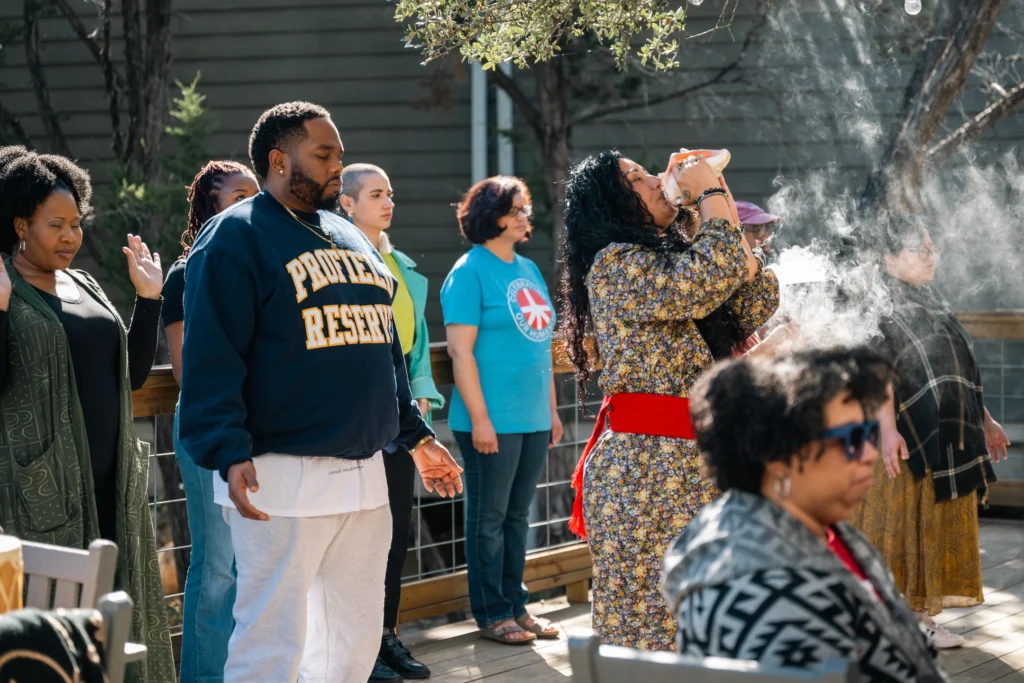In a “Healing Our Healers” blog series, Dr. Rhonda Tsoi-A-Fatt — our Founder and CEO — will outline the small and big steps that we can all take to heal youth of color, our communities, and ourselves. We invite you to join the conversation and share ideas about the ways that you have renewed and rejuvenated yourselves.
When we look back, we shouldn’t feel like we have won as social justice leaders yet lost everywhere else in our lives.
We run from our family to work, to meetings, to networking events, to hospitals, to protests, to legislative sessions, to schools, to the homes of the youth we serve, and then return to our own family in a never-ending cycle. We miss so many moments because our communities need us; it’s an understatement to say that we are stretched thin. But what are we doing to address our collective burnout — as well as our personal and professional need for rest and healing?
In conversations with our grantees, partners, and fellows over the years, we have heard their repeated refrain of pushing through despite their exhaustion. Many have also talked about the lack of safe spaces to share their frustrations and big dreams for the young people they work with each day. I often hear that The Moriah Group (TMG) isn’t like other intermediary funders. Our partners actually feel safe, heard, and actively supported in their work. They can unburden themselves without penalty. And they leave their interactions with us feeling recharged and filled with new energy to keep going.
After working for more than two decades in the racial justice field and leading TMG for nearly 10 years, I’ve learned that there’s a path for all of us as advocates to disrupt dehumanization in communities of color, to reclaim the humanity of our young people, and to take a step back from the work in order to care for and heal ourselves. I’ve outlined four steps in part one of my “Healing Our Healers” series that I feel are crucial in our quest to care for advocates. These steps include:
- Be intentional about modeling balance and self-care.
In my desire to be impactful in disrupting dehumanization and improving life outcomes for youth of color, I’ve experienced my own body breaking down. For years, I’ve traveled, convened people, advocated for communities, and trained people. Without fail, my body would quit on me and I would be extremely ill by December. It seemed like I was always on antibiotics. I had five minor surgeries in four years, and my doctor recommended a sixth one. At one point, I couldn’t lift one arm more than a few inches from my body, and my knees were so inflamed that I couldn’t kneel.
Eventually, I had to take a step back and focus on my healing in a major way so I took a long overdue sabbatical in 2023. I had to practice what I was promoting for everyone else by getting ample rest, exercising, eating better, and taking time away from the work. Gradually, my body began to heal itself. - Recognize that our cultures hold lessons for our healing.
I believe deeply in ancestral memory. Our bodies and souls remember the power of our ancestral medicine and respond to it. Think about the drum, and how our bodies instinctively move to the beat without prompting. Similarly, our souls respond to the healing methods that our ancestors used as a tool of survival. There is a familiarity with healing practices grounded in culture. We may not initially be able to put our finger on it, but our spirits settle into it and feel at home.
The first time I sat on the mat with a Yoruba priest, I cried because I noticed how at peace I felt, how my breathing slowed, and how my spirit settled. I don’t discount the power of Western healing modalities; everyone responds to healing practices differently. However, embracing our ancient practices offers a cultural pathway to healing. - Address the racialized trauma and toxic stress that result from dehumanization.
In 2021, the Centers for Disease Control and Prevention declared racism as a serious public health threat — something people of color have always known. Hopefully, that acknowledgment by our federal government means that resources will be dedicated to eradicating it because the stress of racism and dehumanization isn’t something people of color can simply put down or walk away from. It’s intertwined into our existence for our entire lives. Investment in healing means providing opportunities to manage these stressors and protect ourselves emotionally in ways that feel meaningful to us. It also means reparations for the generations of pain inflicted on our families and communities, which eases the stressors connected to poverty fueled by racism and creates opportunities for regaining lost generational wealth. - Fund the rest and healing of leaders of color.
If nobody addresses the need for care and healing among leaders of color, we are going to continue to see them get sicker and die younger. Philanthropy funds the work of racial and social justice leaders. And philanthropy wants to see the reform that these leaders are advancing implemented sustainably in our systems.
We must recognize that the work of strategically disrupting a system of oppression is deeply personal for people of color and takes a toll on our mental, physical, and emotional health. So, philanthropy should not only invest in the eradication of racism and dehumanization, but also fund the necessary space to ensure the healing of those fighting on the front lines.
TMG has hosted healing spaces for leaders for the last seven years. To date, we have supported 40 leaders and are announcing 20 more who will join our community of care as the third cohort of the Forward Promise Fellowship for Leaders. And I’m excited that we are poised to increase those numbers exponentially with the building of the Ayoku Healing Retreat Center in Murfreesboro, Tennessee in 2025.
Many times, leaders of color are broken by an incident of racial violence that troubles their souls to the point where they walk away from the work forever because it’s too much to bear mentally. When hard-fought policy wins are reversed by a new administration, leaders may throw their hands up in defeat and say, “I can’t fight this battle again.” And sometimes the time away from their families is — quite frankly — no longer worth the sacrifice for advocates.
But I believe with every fiber of my being that we can recapture our victory and our joy in our work. That transformation in our personal and professional lives will require us to collectively take care of ourselves — and to rest.




